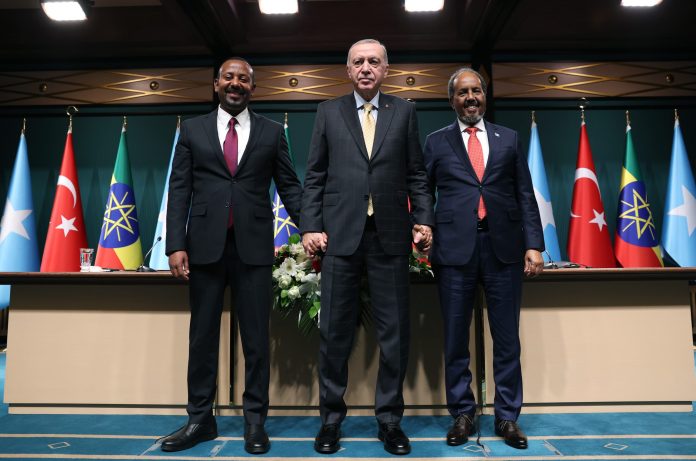ANKARA, Turkey – A year-long diplomatic effort by Turkey to mediate a bitter dispute between Somalia and Ethiopia has stalled, diplomats said, after talks collapsed over Addis Ababa’s controversial bid to secure sea access via the breakaway region of Somaliland, heightening tensions in the volatile Horn of Africa.
The mediation, which began in February 2024, aimed to resolve a crisis sparked by a Memorandum of Understanding (MoU) signed on January 1, 2024. The deal would grant landlocked Ethiopia a 20-kilometer (12-mile) stretch of coastline in Somaliland for a naval base and commercial port in exchange for potential diplomatic recognition of the self-declared republic.
Somalia, which considers Somaliland part of its sovereign territory, vehemently rejected the agreement as a “blatant aggression” and a violation of international law, launching a robust diplomatic campaign to isolate Ethiopia and nullify the deal.
According to two officials familiar with the negotiations, who spoke on condition of anonymity, no meetings have been held since April following the breakdown of technical talks.
The collapse of dialogue
Ankara’s intervention, leveraging its strong ties with both nations, initially showed promise. After three rounds of talks, the parties signed the “Ankara Communiqué” on December 11, 2024. In the declaration, both sides agreed to engage in technical-level dialogue. They affirmed their “respect and commitment to one another’s sovereignty, unity, independence and territorial integrity.”
However, subsequent expert-level meetings held from February 2 to 4, 2025, reached an impasse. Sources indicate the talks faltered over the fundamental sequencing of the core issues: Ethiopia’s demand for sea access and Somalia’s insistence that the MoU with Somaliland be formally abandoned first.
The stalemate was underscored by a defiant statement from Ethiopian Prime Minister Abiy Ahmed to his parliament on July 3, 2025, in which he reiterated that securing a port was an “existential issue” for his country, which has a population of 120 million people. In response, Somalia’s Ministry of Foreign Affairs branded the port deal a “destabilizing land grab” and urged the United Nations Security Council to intervene.
Regional powers drawn in
The diplomatic vacuum has attracted other regional powers, threatening to turn the dispute into a wider geopolitical contest.
In a significant move this week, Egyptian President Abdel Fattah el-Sisi hosted his Somali counterpart, Hassan Sheikh Mohamud, and pledged increased military assistance to help secure Red Sea shipping lanes. Analysts view Cairo’s move as a strategic counterbalance to Ethiopia’s regional ambitions, particularly over Nile water resources.
Meanwhile, Somaliland’s President Muse Bihi Abdi has remained resolute, insisting he will implement the MoU. In October, he accused Mogadishu of forming an “alliance” with Egypt and Eritrea to thwart his region’s economic aspirations.
The stalled talks place Turkey in a delicate position. Ankara is a key strategic partner to Somalia, operating a significant military base and training facility, Camp TURKSOM, in Mogadishu. At the same time, Turkey has supplied Ethiopia with its acclaimed Bayraktar drones.
“All parties must respect internationally recognized borders,” Turkish Foreign Minister Hakan Fidan stated as the talks commenced last year, signaling Ankara’s attempt at neutrality. However, the failure of its mediation highlights the shifting and complex alliances shaping the Horn of Africa.
A precarious stalemate
Somaliland has operated as a de facto independent state since declaring autonomy from Somalia in 1991 following a brutal civil war. While it has maintained relative peace and its democratic institutions, it has not gained international recognition from any country. Hargeisa argues that as a self-governing entity, its agreement with Ethiopia does not require approval from Mogadishu.
Conversely, the federal government in Mogadishu maintains that any agreement made without its consent is legally void and threatens to ignite a new conflict in a region already grappling with instability.
Diplomats have expressed grave concerns that the impasse could undermine international anti-piracy operations in the Gulf of Aden—a critical chokepoint for global trade—and complicate the delivery of humanitarian aid to drought-stricken areas of northern Somalia. There are also fears it could erode fragile security gains made against the al-Qaeda-affiliated militant group, Al-Shabaab.
With Turkey’s mediation on hold and no other interlocutor poised to step in, the fundamental question of Ethiopia’s access to the sea and Somalia’s territorial integrity remains dangerously unresolved.


